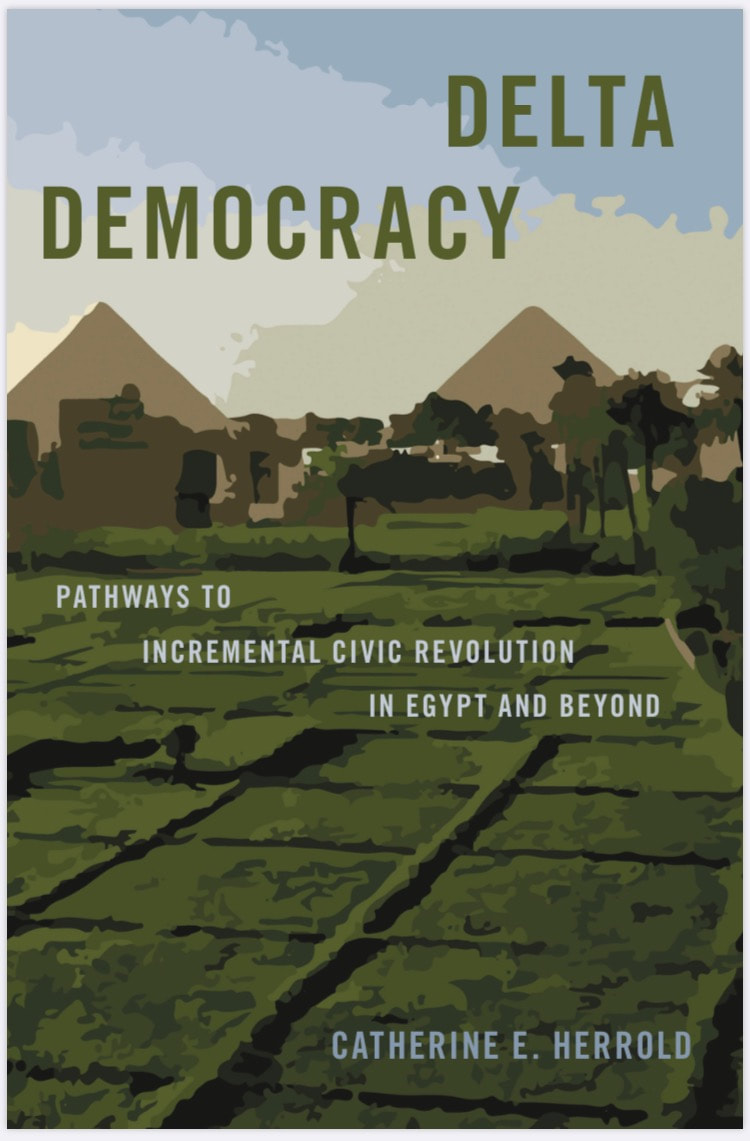Delta Democracy
|
Everyone interested in Egypt and Egyptian politics must read Herrold's illuminating new book, Delta Democracy.
- Steven A. Cook, Council on Foreign Relations The 2011 Arab Spring protests seemed to mark a turning point in Middle East politics, away from authoritarianism and toward democracy. Within a few years, however, most observers saw the protests as a failure given the outbreak of civil wars and re-emergence of authoritarian strongmen in countries like Egypt. But in Delta Democracy, Catherine E. Herrold argues that we should not overlook the ongoing mobilization taking place in grassroots civil society. Drawing upon ethnographic research on Egypt's nongovernmental organizations (NGOs) in the wake of the uprisings, Herrold uncovers the strategies that local NGOs used to build a more democratic and just society. Departing from US-based democracy advocates' attempts to reform national political institutions, local Egyptian organizations worked with communities to build a culture of democracy through public discussion, debate, and collective action. At present, these forms of participatory democracy are more attainable than establishing fair elections or parliaments, and they are helping Egyptians regain a sense of freedom that they have been denied as the long-time subjects of a dictator. Delta Democracy advances our understanding of how civil society organizations maneuver under state repression in order to combat authoritarianism. It also offers a concrete set of recommendations on how US policymakers can restructure foreign aid to better help local community organizations fighting to expand democracy. |
Awards
2021 Virginia A. Hodgkinson Research Book Prize
Presented by the Association for Research on Nonprofit Organizations and Voluntary Action (ARNOVA).
Praise
"Everyone interested in Egypt and Egyptian politics must read Herrold's illuminating new book, Delta Democracy. In this well-written, deeply researched volume, Herrold argues convincingly that 'democracy brokers' in the West and international non-governmental organizations have been manifestly ineffective in advancing democratic change because they fail to understand the political, historical, and social contexts in which they operate. Herrold demonstrates that Egyptian non-governmental organizations and foundations are better positioned for success. Delta Democracy is an invaluable addition to the literature from which academics, policymakers, practitioners, and foundation program officers will benefit."
Steven A. Cook, Eni Enrico Mattei Senior Fellow for Middle East and Africa Studies, Council on Foreign Relations
"Delta Democracy tells the story of Egypt's political trajectory over the past decade--seemingly a familiar one told by headlines about uprisings, elections, coups, and authoritarian rulers--in a fresh and unfamiliar way. Herrold uses a host of small-scale Egyptian organizations, some operating seemingly far from the political field, as a prism to help us understand what democracy means--and does not mean--in a local context."
Nathan Brown, Professor of Political Science and International Affairs, George Washington University
"[A]s Catherine Herrold demonstrates in her incisive and compelling account, Egypt's trajectory requires us to reexamine many of the core assumptions that have shaped the practice of democracy promotion, especially with respect to two sets of critical actors: civil society and the philanthropic sector."
Steven Heydemann, Janet Wright Ketcham 1953 Professor in Middle East Studies, Smith College
"This beautifully written and well-organized study is the book President Biden's team should consider if they seek to strengthen democratic principles through democratic practice."
Susan Liebell, Co-Host of the New Books in Political Science podcast
"Methodologically, the strengths of the book lie in the richness of the author’s qualitative insights and her transparent discussion of her evolving research questions. She compellingly describes how she adjusted her thinking and approach as the political situation in Egypt changed between 2010 and 2017, thereby modeling how to conduct qualitative research in a rapidly evolving context."
Saskia Brechenmacher, PhD Candidate, University of Cambridge and Fellow, Carnegie Endowment for International Peace.
Journal Reviews
Democratization
Saskia Brechenmacher (University of Cambridge) reviews Delta Democracy in Democratization.
Ethics & International Affairs
James Ketterer (The American University in Cairo) reviews Delta Democracy In Ethics & International Affairs.
Mediterranean Politics
Hanaa Ebeid (Al Ahram Center for Political and Strategic Studies) reviews Delta Democracy in
Mediterranean Politics.
Nonprofit Policy Forum
Steven Heydemann (Smith College) reviews Delta Democracy in Nonprofit Policy Forum.
VOLUNTAS: International Journal of Voluntary and Nonprofit Organizations
Lawrence Cumming (Independent Consultant in International Development and Civil Society) reviews Delta Democracy in VOLUNTAS: International Journal of Voluntary and Nonprofit Organizations.
Book Talks
New Books Network Podcast
In this episode of the New Books Network podcast I speak with political scientist Susan Liebell (Saint Joseph's University) about how Egyptian's democracy promotion efforts in the wake of the January 25, 2011 uprisings are relevant to our current political moment.
POMEPS Podcast
In this POMEPS podcast, I discuss Delta Democracy's core argument and the value of political ethnography with Marc Lynch, director of the Project on Middle East Political Science.
Bridging the Gap Book Launch
After my overview of Delta Democracy in this book launch, Steven Cook (Council on Foreign Relations) and Amy Hawthorne (Project on Middle East Democracy) discuss the book's strengths and areas for improvement. We then delve into a vibrant discussion with audience members of the US democracy promotion agenda.
Ordering Information
Available at your favorite bookstore, or support academic publishing by ordering directly from Oxford University Press and save 30% with code ASFLYQ6.
